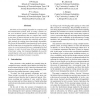Free Online Productivity Tools
i2Speak
i2Symbol
i2OCR
iTex2Img
iWeb2Print
iWeb2Shot
i2Type
iPdf2Split
iPdf2Merge
i2Bopomofo
i2Arabic
i2Style
i2Image
i2PDF
iLatex2Rtf
Sci2ools
108
click to vote
IEEEARES
2006
IEEE
2006
IEEE
E-voting: Dependability Requirements and Design for Dependability
Elections are increasingly dependent on computers and telecommunication systems. Such “E-voting” schemes create socio-technical systems (combinations of technology and human organisations) that are complex and critical, as the future of nations depends on their proper operation. Thus heated debate surrounds their adoption and the possible methods for making them demonstrably dependable. We discuss the dependability requirements for such systems, and the design issues in ensuring their satisfaction, with reference to a recent proposal that uses cryptography for fault tolerance, in order to avoid some of the perceived dangers of electronic voting. Our treatment highlights the need for considering the whole socio-technical system, and for integrating security and fault tolerance viewpoints.
Fault Tolerance | Fault Tolerance Viewpoints | IEEEARES 2006 | Security Privacy | Socio-technical System |
Related Content
| Added | 11 Jun 2010 |
| Updated | 11 Jun 2010 |
| Type | Conference |
| Year | 2006 |
| Where | IEEEARES |
| Authors | Jeremy Bryans, Bev Littlewood, Peter Y. A. Ryan, Lorenzo Strigini |
Comments (0)

